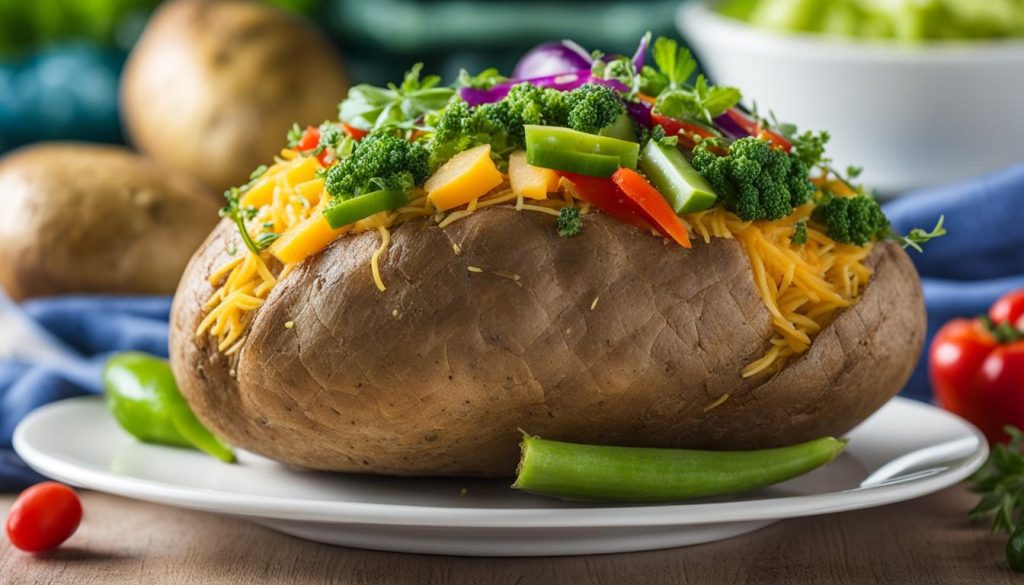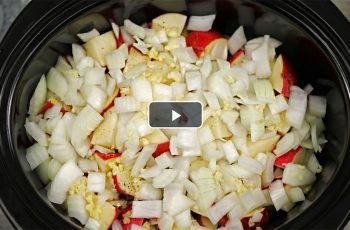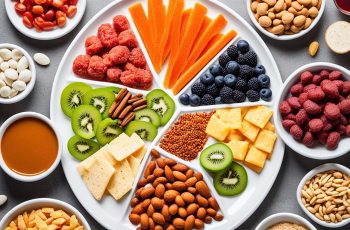Hey there, it’s me again, ready to reveal the amazing health benefits of a food that often gets overlooked – the humble baked potato! Yes, you heard me right, potatoes can actually be good for you. So, put aside any preconceived notions and let’s dive into the nutritional wonders of this beloved tuber.
When it comes to essential nutrients, you’ll find them abundantly packed in potatoes. From energy-boosting carbohydrates to immunity-boosting vitamin C, potatoes have it all. Not to mention the potassium that helps maintain proper heart function and the vitamin B6 that aids in brain development and function.
But what’s so special about baked potatoes specifically? Well, baking them retains more nutrients compared to other cooking methods, making it an ideal option for reaping the nutritional benefits. And the best part? There are countless ways to enjoy this versatile veggie.
Health Benefits of Baked Potato
- Baked potatoes are packed with essential nutrients like vitamin C, potassium, and vitamin B6.
- Baking potatoes helps retain more nutrients compared to other cooking methods.
- There are numerous ways to enjoy the nutritional benefits of baked potatoes.
- Incorporating baked potatoes into a balanced diet can contribute to overall health and well-being.
- Don’t underestimate the power of a baked potato!
Now that we’ve uncovered the truth about baked potatoes, it’s time to embrace their health-boosting potential. Stay tuned as we explore the nutritional powerhouse that is potato nutrition, and how potatoes can contribute to weight management, heart health, and digestive well-being. Trust me, you won’t want to miss out!
The Nutritional Powerhouse: Exploring Potato Nutrition
Potatoes are a nutritional powerhouse, rich in vitamins, minerals, antioxidants, and fiber. They are particularly high in potassium, vitamin C, and vitamin B6. The nutrient content may vary depending on the cooking method, but boiling or baking potatoes with their skin intact helps retain more nutrients.
When it comes to potato nutrition facts, it’s worth noting that a medium-sized baked potato with skin provides approximately:
- 160 calories
- 0 grams of fat
- 4 grams of fiber
- 4 grams of protein
- 37 grams of carbohydrates
- 35% of the daily recommended intake of vitamin C
- 26% of the daily recommended intake of potassium
- 10% of the daily recommended intake of vitamin B6
The Nutrients in Baked Potatoes:
Baked potato vitamins include vitamin C, which is essential for immune function and collagen production. It also acts as an antioxidant, protecting cells from damage caused by free radicals. Potassium is crucial for maintaining normal blood pressure levels, helping with muscle function and nerve transmission. Vitamin B6 plays a role in brain development and function, as well as the production of red blood cells.
Moreover, baked potatoes are a good source of fiber, offering about 15% of the daily recommended intake. Dietary fiber aids in digestion, promotes a healthy gut, and can help regulate cholesterol levels.
Potatoes and Weight Management
When it comes to weight management, incorporating baked potatoes into your diet can have several advantages. Not only are they delicious, but they also offer numerous benefits that can support your health and wellness goals.
One of the advantages of eating baked potatoes is their low calorie density. Due to their high water and fiber content, baked potatoes are filling and satisfying while being relatively low in calories. This means you can enjoy a satisfying portion without consuming excessive calories, making them a great option for weight-conscious individuals.
Potatoes are also rich in fiber, which has several benefits for weight management. Fiber helps promote feelings of fullness and satiety, reducing the likelihood of overeating. By including baked potatoes in your diet, you can enhance portion control and keep your calorie intake in check.
Additionally, the fiber found in potatoes contributes to improved digestion. It supports a healthy gut and can prevent constipation. By maintaining regular bowel movements, potatoes can aid in weight management and overall digestive health.
When preparing potatoes, it’s essential to choose healthier cooking methods like baking or boiling. By avoiding deep frying, you can maximize the benefits of baked potatoes for weight management. These cooking methods help retain the nutrients and natural flavors of the potatoes without adding excessive calories from oils or fats.
So, if you’re looking to manage your weight and enjoy a nutritious addition to your meals, including baked potatoes in your diet can be a smart choice. Whether as a satisfying side dish or the star of a well-balanced meal, potatoes can help support your weight management goals with their low calorie density, fiber content, and healthy cooking methods.
The Benefits of Including Baked Potatoes in Your Diet:
- Low in calorie density
- High in water and fiber content
- Promote feelings of fullness and satiety
- Support portion control
- Aid in digestion and gut health
- Choose healthier cooking methods like baking or boiling

Promoting Heart Health with Potato Consumption
Potatoes offer a range of health benefits, including potential advantages for heart health. These humble tubers contain certain compounds that have been linked to lower LDL cholesterol, also known as the “bad” cholesterol, and can support healthy blood pressure levels due to their high potassium content. Including potatoes in your diet can be a heart-healthy choice.
Antioxidants play a crucial role in promoting heart health, and potatoes are a surprising source of these beneficial compounds. Potatoes contain a variety of antioxidants that help combat oxidative stress and reduce inflammation in the body. These antioxidants can help protect the cardiovascular system and contribute to overall heart health.
When it comes to maximizing the heart-healthy benefits of potatoes, it’s important to employ healthy cooking methods. Deep frying potatoes can add unhealthy fats and increase calorie intake, which may counteract the potential benefits. To ensure you’re getting the most out of your potatoes, opt for baking or boiling them instead.
The Nutritional Power of Potato Skins
One often overlooked aspect of potatoes is their skins, which are rich in nutrients and can offer additional health benefits. Potato skins contain a concentrated amount of antioxidants, fiber, and vitamin C, among other essential nutrients. By consuming potatoes with their skins intact, you can enjoy these added nutritional benefits. Try leaving the skins on when baking your potatoes or explore recipes that incorporate them for a wholesome and nutrient-dense option.
In conclusion, potatoes can play a beneficial role in promoting heart health. Their potential to lower LDL cholesterol and support healthy blood pressure, combined with their antioxidant content, makes them a valuable addition to a heart-healthy diet. To reap the most benefits, opt for healthy preparation methods like baking or boiling and consider including the nutrient-rich potato skins in your meals.
The Role of Potatoes in Digestive Health
Potatoes are not just a delicious and versatile vegetable; they also play a significant role in promoting digestive health and gut functionality. One of the key factors that contribute to their digestive benefits is their high content of potato fiber.
Potatoes are rich in dietary fiber, including a specific type called resistant starch. This type of fiber adds bulk to the stool, facilitating regular bowel movements and preventing constipation. Additionally, resistant starch acts as a prebiotic, nourishing the beneficial bacteria in the gut and promoting a healthy gut microbiome.
By incorporating potatoes into your diet, you can aid digestion and enhance nutrient absorption. The combination of fiber and nutrients in potatoes helps to maintain proper digestive function and supports overall gut health.
The Benefits of Potato Fiber in Digestion:
- Promotes regular bowel movements
- Prevents constipation
- Nourishes beneficial gut bacteria
- Supports a healthy gut microbiome
- Enhances nutrient absorption
To fully reap the digestive benefits of potatoes, it is important to opt for healthier preparation methods like baking. Baked potatoes retain more of their potato nutrients and baked potato vitamins compared to frying. Including potatoes as part of a balanced diet can contribute to improved gut health and overall well-being.

With their natural goodness, potatoes provide a delicious and nourishing way to support your digestive system. So, why not incorporate them into your meals and unlock all the digestive benefits they have to offer?
Diverse Ways to Enjoy the Nutritional Benefits of Potatoes
When it comes to enjoying the nutritional benefits of potatoes, there are countless delicious options to explore. Whether you prefer baking or boiling, potatoes can be prepared in various ways while still retaining their valuable nutrients. One key tip is to keep the skin intact, as it contains a significant amount of fiber and other beneficial compounds.
If you’re looking for healthy potato recipes, consider trying roasted sweet potato wedges. Simply cut the sweet potatoes into wedges, toss them with a touch of olive oil, and sprinkle with your favorite seasonings like garlic powder, paprika, and a pinch of salt. Roast them in the oven until they are crispy on the outside and soft on the inside. Not only do they make a tasty snack or side dish, but they also provide essential vitamins and minerals.
Another option to consider is baked potato skins filled with nutritious ingredients. After baking the potatoes, scoop out the flesh while leaving a thin layer of potato attached to the skin. Then, fill the skins with a mixture of cooked vegetables, such as broccoli or spinach, and top it off with a sprinkle of cheese. Place the filled skins back in the oven until the cheese is melted and bubbly. This recipe allows you to enjoy the benefits of both the potato fiber and the vitamins and minerals from the vegetables.
Add variety to your meals by exploring different potato recipes that suit your taste buds. From mashed potatoes to potato salads, the options are endless. By incorporating these healthy potato recipes into your diet, you can savor the delicious flavors while reaping the nutritional rewards.
Debunking Common Misconceptions About Baked Potato Nutrition
There are many misconceptions surrounding the nutrition of baked potatoes, often leading to the false belief that they are empty calories or fattening. However, the truth is quite the opposite. Baked potatoes are packed with essential nutrients and can be a beneficial part of a healthy diet.
When it comes to nutrient content, baked potatoes are rich in vitamins and minerals. They contain significant amounts of vitamin C, potassium, and vitamin B6, which are vital for various bodily functions. These nutrients contribute to enhanced immune function, improved heart health, and better digestion.
One common misconception is that frying potatoes is just as nutritious as baking them. However, the cooking method plays a significant role in nutrient retention. Baking potatoes helps preserve more of their nutrients compared to frying, which can deplete the nutritional value.
Another mistake is to believe that potatoes are inherently fattening. In reality, they are relatively low in calories when prepared in a healthy manner. Baked potatoes, especially when consumed with their skin, provide a good source of dietary fiber. This fiber promotes satiety, helps control portion sizes, and supports weight management.
Furthermore, the health benefits of potatoes should not be overlooked. Potatoes offer advantages in terms of heart health, digestive health, and overall well-being. By incorporating baked potatoes into a balanced diet, individuals can harness the full spectrum of potato nutrition.
Myth: Baked potatoes are empty calories.
This assertion couldn’t be further from the truth. Baked potatoes are nutrient-dense, containing essential vitamins and minerals that contribute to overall health and well-being. They provide an excellent source of baked potato nutrients.
Fact: Baking retains more nutrients compared to frying.
When potatoes are fried, they tend to absorb more oil, leading to increased calorie content and reduced nutrient levels. Baking potatoes helps preserve their natural goodness and maximizes their nutritional benefits, making them a healthier choice.
Myth: Potatoes are fattening.
Potatoes themselves are not inherently fattening. It is the preparation methods, such as deep-frying or loading them with high-fat toppings, that can contribute to excessive calorie intake. Baked potatoes, when consumed in moderation and paired with nutritious accompaniments, can be part of a balanced and healthy diet.
By dispelling these misconceptions and embracing the reality of baked potato nutrition, individuals can enjoy the advantages of this versatile and nutrient-rich food.
Conclusion
Incorporating baked potatoes into your diet can have a profound impact on your overall well-being. Not only are they delicious and versatile, but they also offer a wide range of health benefits.
First and foremost, baked potatoes can support weight management. Their low calorie density and high fiber content make them a filling food choice that can help control portion sizes and curb cravings.
Furthermore, the nutritional benefits of baked potatoes extend to heart health. With compounds that may lower LDL cholesterol and a high potassium content that supports healthy blood pressure levels, they can be a valuable addition to a heart-healthy diet.
Lastly, baked potatoes contribute to digestive health. Their rich fiber content, including resistant starch, aids in digestion, promotes gut health, and enhances nutrient absorption.
By enjoying the wholesome goodness of baked potatoes as part of a balanced diet, you can unlock their true potential and reap the many nutritional benefits they offer. So go ahead, savor the deliciousness of baked potatoes while nourishing your body!
FAQ
What nutrients are found in baked potatoes?
Baked potatoes are rich in essential nutrients such as carbohydrates, vitamin C, potassium, and vitamin B6.
How do baked potatoes contribute to weight management?
Baked potatoes are low in calorie density due to their high water and fiber content, which helps promote a feeling of fullness and can aid in controlling portion sizes.
Can baked potatoes support heart health?
Certain compounds in potatoes may help lower LDL cholesterol, and their high potassium content can support healthy blood pressure levels, both of which contribute to heart health.
How do potatoes promote digestive health?
Potatoes are high in dietary fiber, including resistant starch, which adds bulk to the stool and supports beneficial gut bacteria, aiding digestion and enhancing nutrient absorption.
What are some ways to enjoy the nutritional benefits of potatoes?
Baking or boiling potatoes with their skin intact helps retain nutrients. You can enjoy healthy potato recipes such as roasted sweet potato wedges or baked potato skins filled with nutritious ingredients.
Are baked potatoes empty calories or fattening?
Baked potatoes are rich in vitamins and minerals, making them a nutritious addition to a healthy diet. Baking retains more nutrients compared to frying, and potatoes offer numerous health benefits.
What are the health benefits of including potatoes in your diet?
Incorporating potatoes into a balanced diet can improve immune function, digestion, heart health, and overall well-being.




